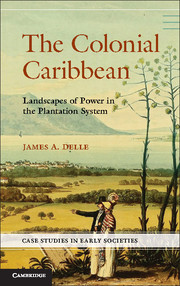Book contents
- Frontmatter
- Contents
- Figures
- Tables
- Preface
- 1 Landscapes of Power in the Colonial Caribbean
- 2 His Majesty’s Island
- 3 The Plantation Mode of Production
- 4 A Class for Itself: Regional Landscapes of the Planter Class
- 5 Contradictions and Dialectics: Village Landscapes of the Enslaved
- 6 Dialectics and Social Change: Plantation Landscapes after Slavery
- 7 Plantation Landscapes in Comparative Perspective
- 8 Conclusion
- References
- Index
5 - Contradictions and Dialectics: Village Landscapes of the Enslaved
Published online by Cambridge University Press: 05 June 2014
- Frontmatter
- Contents
- Figures
- Tables
- Preface
- 1 Landscapes of Power in the Colonial Caribbean
- 2 His Majesty’s Island
- 3 The Plantation Mode of Production
- 4 A Class for Itself: Regional Landscapes of the Planter Class
- 5 Contradictions and Dialectics: Village Landscapes of the Enslaved
- 6 Dialectics and Social Change: Plantation Landscapes after Slavery
- 7 Plantation Landscapes in Comparative Perspective
- 8 Conclusion
- References
- Index
Summary
Few archaeologists today would argue that archaeological data can be interpreted in the absence of an overarching theory explaining how and why societies form, operate, and change. Indeed, the modern history of archaeological thought has been characterized by the convincing use of many theoretical constructs to explain human cultures and histories: cultural ecology (e.g., Steward 1990), logical positivism (e.g., Binford 2002), behavioral ecology (e.g., Bird and O’Connell 2006), sociobiology (e.g., Shennan 2008), practice theory (e.g., Delle 2011), chaos theory (e.g., Beekman and Baden 2005), game theory (e.g., Neiman 2008), performance theory (e.g., Pearson and Shanks 2001), queer theory (e.g., Croucher 2005; Voss 2000), signaling theory (e.g., Bird and Smith 2005; Galle 2011), semiotics (e.g., Prucell 2006), hermeneutics (e.g., Johnsen and Olsen 1992), cultural materialism (e.g., Harris 2001; Price 1982), and Marxism (e.g., McGuire 1992). Each of these theoretical frameworks has at its base a distinct philosophical underpinning composed of an ontology defining the nature of human existence and an epistemology shaping the nature of archaeological inquiry.
An ontology, literally defined as a “study of being,” is a philosophical framework that defines how material and social phenomena are categorized, and how these phenomena actively relate and link to each other to create human experience. An ontology thus defines both the boundaries of what is known to exist and what can be known; creates categories of existence; and proposes causal links between humans, objects, and events. Whether consciously or not, all archaeological theories emerge from ontological frameworks defining what can be known about the past, and how we can relate the artifacts we recover in the twenty-first century to the experiences of people who lived in the past.
- Type
- Chapter
- Information
- The Colonial CaribbeanLandscapes of Power in Jamaica's Plantation System, pp. 142 - 176Publisher: Cambridge University PressPrint publication year: 2014



